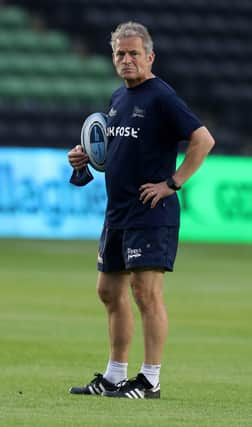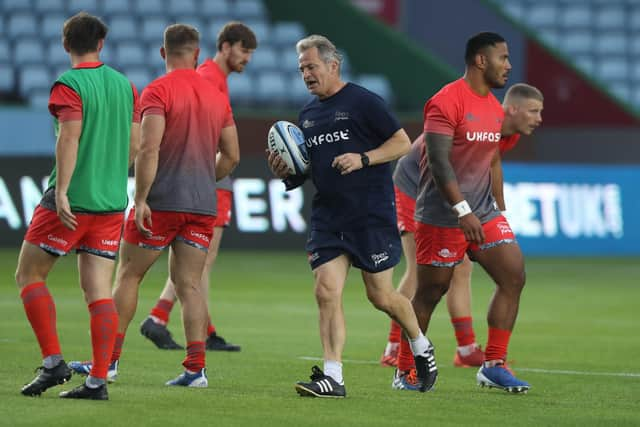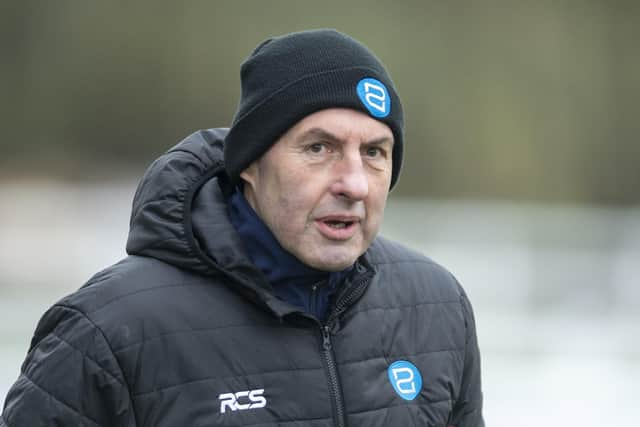Former England player and coach Jon Callard back where it all started at Leeds Tykes and looking to develop new talent


“It sounded like Status Quo,” joked Callard, who was announced as Leeds Tykes’ new head coach on Wednesday, almost 20 years ago after first joining the club’s coaching staff.
Now, as then, Phil Davies is director of rugby and the duo will be looking to kick-start matters, even if the environment - National One - is distinctly different to the last time they strummed together in the Premiership and Europe.
Advertisement
Hide AdAdvertisement
Hide AdLeinster chief Lancaster, of course, is another Tykes coaching alumni who was head of their academy when the band first started playing and, like Callard, went from Headingley to work for the RFU.


Although Lancaster ended up being England head coach - “I did, too, for one match against the Barbarians!” - Callard spent most of his time at headquarters working with some of the country’s finest young talents.
He joined the RFU’s national academy in 2005, shortly after arguably Tykes’ finest hour, helping them beat his former club Bath in a famous Powergen Cup final win at Twickenham.
Along the way, at various points, he coached England Saxons, England Under 20s and was also England’s kicking coach when they reached the 2007 World Cup final.
Advertisement
Hide AdAdvertisement
Hide AdHis last job with the governing body was as national performance manager but he left five years ago and started up his own sports consultancy.


Throughout all of this, Callard, now 55, has lived in Harrogate where his wife Gail hails from.
On rejoining Leeds, he told The Yorkshire Post: “I’ve done a lot of travelling for 20 years and Phil rang me and said ‘what do you think?’ Actually it fits because even though there’s still a bit of travelling it’s not like I used to do.
“Then, I’d leave on a Sunday night, get home on a Friday and do 45 and 50,000 miles per year, racing around clubs and seeing aspiring players and working in the pathways which was really exciting.
Advertisement
Hide AdAdvertisement
Hide Ad“My youngest has just gone to university and I’d thought it’d be nice to be around.
“But, if I’m perfectly frank, after three good years and the success we had (from 2002 to 2005), to see where Leeds went after that was heartbreaking.
“In an area like Leeds, there’s so many feeder clubs and they have their own aspirations but Leeds was like a symbol at that time for those clubs and players.
“It’s just sad that there’s nothing there; last April I was led to believe the club only had eight players...?
Advertisement
Hide AdAdvertisement
Hide Ad“Yes, this is a fight and it will be a fight in National One as there’s a lot of good teams with aspirations and a lot with good backing. But for me it’s the challenge - and being back at the coalface. I’m excited by it.”
Callard, who played for the great Bath sides of the mid-1990s which lifted the Heineken Cup in 1998, has also worked for another national sporting body in recent years.
A renowned goalkicker in his playing days, he took an active interest in the technical development of the kicking mechanics in sport, developing and implementing the ‘Dead Ball Striking programme’ for the FA.
“I was approached by (former FA head of team strategy and performance) Dave Reddin, Dan Ashworth and Matt Crocker about the analysis of 900 corners and 900 free-kicks,” he recalled.
Advertisement
Hide AdAdvertisement
Hide Ad“Three hundred came from internationals, 300 from the Premier League and 300 from European games.
“The staggering figures that came out of it is that 80 percent of free-kicks never hit the target and 60 percent of corners never hit anybody at all. Staggering.
“That was the basis for which they wanted a specialist to try and build, educate and develop a process of striking a dead ball.
“For the study I did in rugby union, the biomechanics of it, I teamed up with a guy called Neil Bezodis, a good friend of mine who works in Swansea University.
Advertisement
Hide AdAdvertisement
Hide Ad“He helped me enormously apply the movement pattern and breaking it down into coaching and the technique of developing it within youngsters.
“It gets quite technical and there’s lots involved including how all the body is incorporated into the action of kicking, not just leg speed. I was fascinated by it.
“There’s no goalkicker in rugby in England that hasn’t had it done: (George) Ford, (Owen) Farrell, (Henry) Slade, (Elliot) Daly, (Mike) Brown, (Sam) Olver, (Ryan) Lamb.... You name them, we’ve done it. They’ve all been analysed and tested and the fruits of that went into football.”
Callard, who won the last of his five Test caps against South Africa in 1995, has worked with a number of England footballers on the process.
Advertisement
Hide AdAdvertisement
Hide Ad“There was Ben Chilwell and James Maddison took part, too, along with Callum Hudson-Odoi and Liam Delap,” he said.
“Unfortunately Ben Ashworth went to Brighton and it just stopped (with the FA).
“But it’s still there in the programme and now I am working with some Premier League football clubs.
“You can see the improvement with the naked eye, but I also enjoy the level of engagement you get.
Advertisement
Hide AdAdvertisement
Hide Ad“It’s not just he takes them and has a bag of balls; there’s a scientific process and, what is really fundamental in any sport, is it’s now helping develop players rather than find players.”
Since leaving the RFU, where Callard’s role at one point involved driving to Brighton College once per week to work with current England star Marcus Smith, he has helped out at Sale Sharks and also coached kicking with Super League club Warrington Wolves.
But this lunchtime he will be at West Park Leeds as Tykes - in their new home - take on Oxfordshire side Chinnor.
Davies will carry on coaching the side until Christmas, with Callard alongside, before the Welshman steps back to concentrate on the club’s wider strategy.
Advertisement
Hide AdAdvertisement
Hide AdCallard said: “That’s rightly so; I need four to six weeks to get to know the players properly, understand their aspirations, what they need to work on and set up IDPs (individual development plans) for them.
“Even though it’s National One and these boys are part-time and work as well, they can still have IDPs to work on.
“They will help them get better at their core skills and their function-fit skills.
“They are the ones that rely on a trait or a particular skill for a particular position so hooker obviously needs them and a scrum half.
Advertisement
Hide AdAdvertisement
Hide Ad“I’d love to think - and it is my passion - that we could become known as a club that is renowned for development.
“I’ve seen a little bit of the league and it is very, very competitive. But it shouldn’t be less enjoyable than any other level of the sport.”
Comment Guidelines
National World encourages reader discussion on our stories. User feedback, insights and back-and-forth exchanges add a rich layer of context to reporting. Please review our Community Guidelines before commenting.